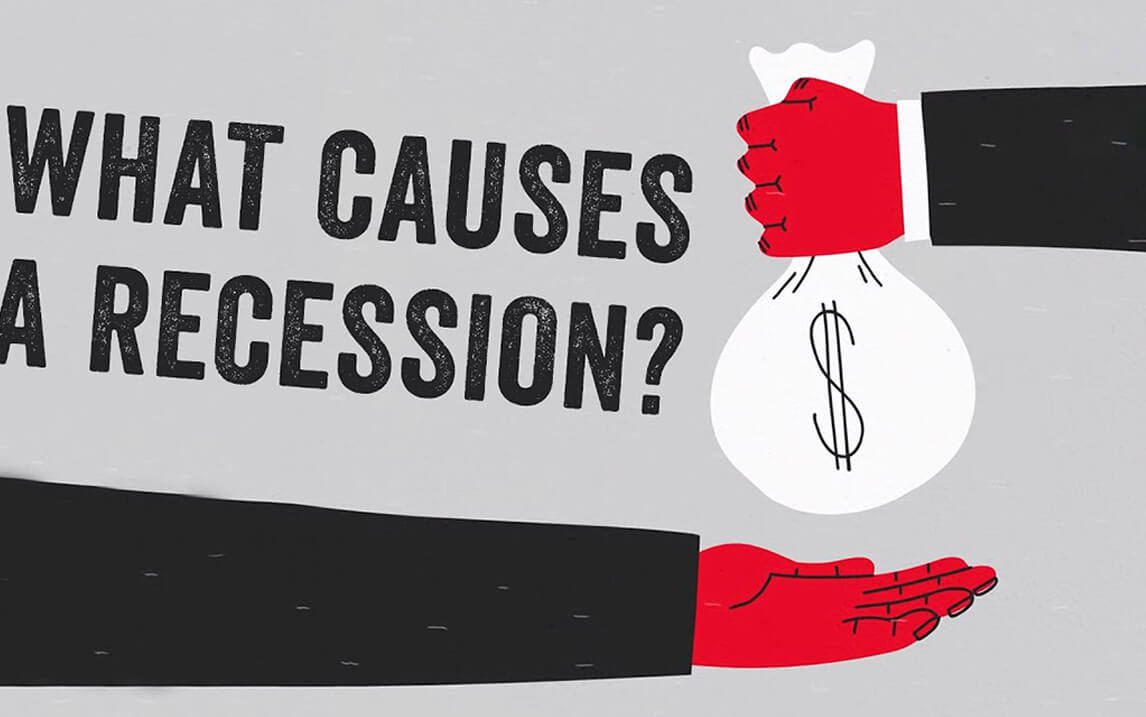(单词翻译:单击)
For millennia, the people of Britain had been using bronze to make tools and jewelry, and as a currency for trade.
千百年来,英国人民一直用青铜制造工具和珠宝,并用作贸易的货币。
But around 800 BCE, that began to change:
但大约在公元前800年,状况开始改变:
the value of bronze declined, causing social upheaval and an economic crisis -- what we would call a recession today.
青铜的价值下降,导致社会动荡和经济危机--即我们今天所称的经济衰退。
What causes recessions? This question has long been the subject of heated debate among economists, and for good reason.
是什么导致了经济衰退呢?长期以来,这个问题一直是经济学家们激烈辩论的话题,并且有充分的理由。
A recession can be a mild decline in economic activity in a single country that lasts months,
衰退可以是一个国家里持续数月的经济活动轻微下降,
a long-lasting downturn with global ramifications that last years, or anything in between.
可以是一个持续几年、影响全球的长期不景气,或是介于两者之间的情况。
Complicating matters further, there are countless variables that contribute to an economy's health,
更复杂的情况下,有无数变量影响经济健康,
making it difficult to pinpoint specific causes.
造成难以确定具体原因。
So it helps to start with the big picture:
因此,从大局开始有助于理解:
recessions occur when there is a negative disruption to the balance between supply and demand.
当不利冲击打破供需平衡,就会产生经济衰退。
There's a mismatch between how many goods people want to buy, how many products and services producers can offer,
人们想买的商品数量、产品和服务生产商可以提供的数量、
and the price of the goods and services sold, which prompts an economic decline.
以及商品和服务售价三者间的不匹配引发了经济衰退。
An economy's relationship between supply and demand is reflected in its inflation rates and interest rates.
供需之间的经济关系反映在通货膨胀率和利率上。
Inflation happens when goods and services get more expensive.
商品和服务越来越贵时,就会发生通货膨胀。
Put another way, the value of money decreases. Still, inflation isn't necessarily a bad thing.
换句话说,钱贬值了。尽管如此,通货膨胀并不一定是坏事。
In fact, a low inflation rate is thought to encourage economic activity.
事实上,低通货膨胀率被认为可促进经济活动。
But high inflation that isn't accompanied with high demand can both cause problems for an economy and eventually lead to a recession.
但高通胀若无高需求与之相伴,既可带来经济问题,又最终导致经济衰退。
Interest rates, meanwhile, reflect the cost of taking on debt for individuals and companies.
同时,利率则反映了个人和公司所承担债务的成本。
The rate is typically an annual percentage of a loan that borrowers pay to their creditors until the loan is repaid.
利率,通常是贷款还清前借款人向债权人所支付的利息与贷款总额的年度百分比。
Low interest rates mean that companies can afford to borrow more money, which they can use to invest in more projects.
低利率意味着公司有能力借更多的钱,可以用来投资更多项目。
High interest rates, meanwhile, increase costs for producers and consumers, slowing economic activity.
同时,高利率也增加了生产者和消费者的成本,进而放缓经济活动。

Fluctuations in inflation and interest rates can give us insight into the health of the economy,
通货膨胀和利率的波动可让我们洞察经济健康状况,
but what causes these fluctuations in the first place?
但是首先,什么原因导致这些波动?
The most obvious causes are shocks like natural disaster, war, and geopolitical factors.
最明显的原因像自然灾害、战争这样的冲击和地缘政治因素。
An earthquake, for example, can destroy the infrastructure needed to produce important commodities such as oil.
例如,地震,能破坏生产重要商品所需的基础设施,如石油。
That forces the supply side of the economy to charge more for products that use oil,
这迫使经济供给方对使用油的产品收取更多费用,
discouraging demand and potentially prompting a recession.
进而抑制需求,并可能引发经济衰退。
But some recessions occur in times of economic prosperity -- possibly even because of economic prosperity.
但有些经济衰退发生在经济繁荣时--甚至可能因为经济繁荣。
Some economists believe that business activity from a market's expansion can occasionally reach an unsustainable level.
一些经济学家认为,市场扩张的商业活动可偶尔达到一个不可持续的水平。
For example, corporations and consumers may borrow more money with the assumption that economic growth will help them handle the added burden.
例如,在假定经济增长的前提下,公司和消费者可能借更多钱来帮他们处理增加的负担。
But if the economy doesn't grow as quickly as expected, they may end up with more debt than they can manage.
但是,如果经济增长不及预期,最终,他们可能因还不上款而债台高筑。
To pay it off, they'll have to redirect funds from other activities, reducing business activity.
为了还清,他们必须重新分配活动的资金,减少业务活动。
Psychology can also contribute to a recession.
心理状态也是经济衰退的因素。
Fear of a recession can become a self-fulfilling prophecy if it causes people to pull back investing and spending.
如果人们对经济衰退的恐惧导致其撤回投资和消费,这种恐惧就成为自我实现的预言。
In response, producers might cut operating costs to help weather the expected decline in demand.
为了应对,生产商可能降低运营成本,来帮助应对预期的需求下降。
That can lead to a vicious cycle as cost cuts eventually lower wages, leading to even lower demand.
因为成本削减最终降低了工资,这样可导致恶性循环,造成需求的再度减少。
Even policy designed to help prevent recessions can contribute.
甚至预防经济衰退的政策,也能促成经济衰退。
When times are tough, governments and central banks may print money, increase spending, and lower central bank interest rates.
困难时期,政府和央行可能会印钞,造成支出增加和央行利率下降。
Smaller lenders can in turn lower their interest rates, effectively making debt "cheaper" to boost spending.
较小的贷方可反过来降低其利率,有效使贷款“更便宜”以刺激消费。
But these policies are not sustainable and eventually need to be reversed to prevent excessive inflation.
但是这些政策是不可持续的,最终需要回收货币来防止过度通货膨胀。
That can cause a recession if people have become too reliant on cheap debt and government stimulus.
如果人们变得过于依赖廉价贷款以及政府激励,这样可能导致经济衰退。
The Bronze recession in Britain eventually ended when the adoption of iron helped revolutionize farming and food production.
当开始采用铁帮助农业革命和粮食生产时,英国青铜经济衰退最终结束。
Modern markets are more complex, making today's recessions far more difficult to navigate.
现代市场更为复杂,使今天的经济衰退更难以找到正确的方法应对。
But each recession provides new data to help anticipate and respond to future recessions more effectively.
但每次经济衰退都提供了新数据,更有效地帮助预测和响应未来的衰退。


